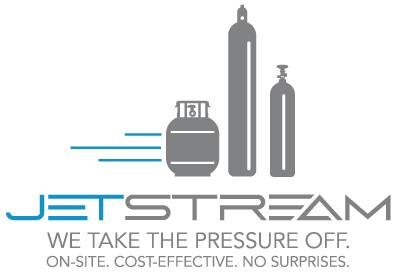Learn how Jet Stream Compressed Gas Services Helps you.
Our Process
Personalized Service; professional services. We take the pressure off deciding who to hire.
Our Process
Identify
We assess the contents of spent compressed gas cylinders. A pile of miscellaneous gas cylinders can present a serious hazard as it sits in your scrap yard or other recovery facility
Eliminate
We safely extract the gas residue. Most cylinders contain easily manageable substances such as oxygen, nitrogen, propane and acetylene. We vent them into the atmosphere or safely flare them off.
Recapture
We recycle any valuable gases. Gases such as freon, nitrogen and nitrous oxide can be recovered and repackaged in cylinders that can be resold.
Salvage
We prepare damaged cylinders to be reclaimed as scrap metal. When cylinders are designated as scrap, we puncture the tank or shear off the valves to render them safe so you can safely process at your facility and or sell the metal as scrap. You recoup costs while you eliminate a hazard.
Disposal
In our experience this is rarely encountered (less than 0.5% of over 300,000 cylinders we have processed over the past 105 years), but we are prepared to support our clients if the need arises.
If we encounter hazardous or “mystery cylinders” onsite that cannot be identified, we supply options and pricing for removal and disposal of these potentially dangerous cylinders safely through third party vendors. We assist the client in managing these vendors that specialize in hazardous cylinder disposal through approved methods that meet all regulatory requirements.
“We used other companies, and had some complaint points, especially with scheduling and transparency. One company invoiced us 4 times what we talked about. Honestly, when I came to JetStream I was gun-shy. However this company was clear upfront about costs. When all was said and done, they came in and took care of the job. I recommend them.”
DJ McLeod
Fligeltaub
Here’s how we process…
Fire Extinguishers
Powder based contents are captured in heavy duty garbage bags for disposal in traditional landfills by the client.
Acetylene Cylinders
(Asbestos containing)
CGA recommended handling procedures for Acetylene cylinders containing asbestos is to burn off any remaining gas, de-valve the cylinder and then stand upright and allow to vent for 30 days. After the 30-day venting period the cylinders can be disposed of in landfills that accept this type of materials. JSCGS can assist the client with locating these landfills for disposal of Acetylene cylinders.
Methane Cylinders
Methane cylinders are processed by burning off any residual methane, de-valve and drill the cylinder. The cylinders can then be processed as scrap by the client.
Hazardous Cylinders
(containing chlorine/ammonia)
If we encounter hazardous or mystery cylinders onsite that cannot be identified, we supply options and pricing for removal and disposal of these potentially dangerous cylinders safely through third party vendors. We assist the client in managing these vendors that specialize in hazardous cylinder disposal through approved methods that meet all regulatory requirements. In our experience this is rarely encountered (less than 0.5% of over 300,000 cylinders we have processed over the past 10 years), but we are prepared to support our clients if the need arises.
Hazardous / “Mystery” Cylinders
Cylinders that cannot be identified are treated as hazardous cylinders. Due to our experience with compressed gas cylinders we are very well versed in determining cylinder type by valve type and cylinder
construction.
Frequently Asked Questions
Have questions about our compressed gas cylinder recycling services? We’ve compiled a list of our most frequently asked questions here.
How do I dispose of a propane tank from my home?
Jet Stream CGS suports commercial clients and does not offer residential services. For suggestions on “How to Dispose of a Propane Tank” consumers can see this article on EHow.com
What geographic area do you serve?
Though based in the Southeast, we offer our services nationwide. We can send our truck and crew to you.
How large is a typical job?
We handle large and small cylinder projects. From cylinder lots to scrap yards we can provide your company the most cost effective means to dispose of your unwanted cylinders. Many of our customers have multiple locations and may have accumulated hundreds of compressed gas cylinders, others have only one site and a few cylinders. We treat each customers cylinder project with the same enthusiasm and professionalism. We strive to provide a cost effective cylinder management solution for all of our clients large and small. We can typicall process 100 to 200 cylinders a day, depending on what shape they’re in and whether their contents are known
How long does a typical job take?
Job length is largely dependent on the number of cylinders and the condition of the cylinders. Generally disposal will usually take just one to three days, dependent on how many cylinders there are, what condition they are in, and the gasses contained within the cylinders.
How much do you charge?
Day rates are available for smaller quantities, per unit pricing is available for large cylinder lots.
What kinds of gases do these tanks typically hold?
Compressed gas cylinders may have held flammable, explosive, corrosive, toxic or inert gases.
Some contained propane for home grills and helium for party balloons and were intended for one-time use. Others are refillable propane tanks and industrial and medical gas cylinders for oxygen, acetylene, chlorine, carbon dioxide, etc.
Today, empty propane tanks are popular with criminals for storing anhydorous ammonia to cook up crystal meth. Acetylene cylinders may contain asbestos and acetone residue. Identifying and handling tanks such tanks is part of the disposal job.
What determines whether you re-valve a cylinder or recycle it?
The re-valving of cylinders is dependent on the certification date of the cylinder, the physical condition of the cylinder, and whether a client wants us to recommission tanks or destroy them.
What certifications do you have?
We have obtained all necessary State and Federal Licenses , and we are fully insured.

